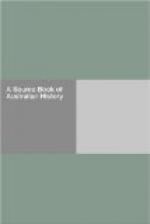The good people of Victoria were rather jealous of the importance given by these events to the other colony. Committees were formed and rewards were offered for the discovery of a gold-field in Victoria. The announcement of the Clunes diggings in July 1851 was the result; they were situated on a tributary of the Lodden. On 8 September those of Ballarat, and on the 10th those of Mount Alexander completely satisfied the most sceptical as to the vast mineral wealth of the colony. Bendigo soon was heard of, and gully after gully successfully attracted the attention of the public by the display of their golden treasures.
EFFECTS OF THE GOLD DISCOVERY
+Source.+—The Gold Digger (Rev. David Mackenzie, M.A.), pp. 28-31
The excitement produced throughout the colonies, but especially in Sydney and Melbourne, by the publication of the gold discovery, may be inferred from the following facts: In one week upwards of 2,000 persons were counted on the road to the Bathurst diggings, and only eleven coming down. Hundreds of men, of all classes and conditions, threw up their situations, and leaving their wives and families behind them, started for the diggings. Whole crews ran away from their ships, which were left to rot in our harbours, the men having willingly forfeited all their wages, clothes, etc. Within one week the prices of the following goods rose twenty-five per cent. in Sydney: flour, tea, sugar, rice, tobacco, warm clothing, and boots. Throughout all the towns nothing was saleable but provisions and diggers’ tools and clothing. Every man who could handle a pick or spade was off, or preparing to be off, for the gold-fields. The roads were crowded with travellers, carriages, gigs, drays, carts, and wheelbarrows; mixed up in one confused assemblage might be seen magistrates, lawyers, physicians, clerks, tradesmen, and labourers.
The building of houses, bridges, etc., was suspended for want of tradesmen, nearly all of them having gone to the diggings. Many houses might be seen half-finished for want of men to proceed with the work, though the owners or contractors were offering enormously high wages to any that would complete the work. The fields were left unsown, flocks of sheep were deserted by their shepherds. With one stockholder who has twenty thousand sheep, there remained only two men. Masters were seen driving their own drays; and ladies of respectability and ample means were obliged to cook the family dinner. Servants and apprentices were off in a body; and even the very “devils” bolted from the newspaper offices; in short, the yellow fever seized on all classes of society. In twenty-four hours prices of provisions doubled at Bathurst and the neighbouring places. In all our steamers and trading vessels the rate of passage was raised, in consequence of the necessary increase in the wages of seamen. All the trades held their meetings, at which a new tariff of charges was agreed upon; and even the publicans raised at least twenty-five per cent. the prices of their wines, beer, and spirits.




